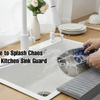Embrace Convenience and Safety with Door Closers: An In-Depth Guide to Automatic Door Closers
- by HASTHIP ST
In our fast-paced world, efficiency, security, and convenience are all top priorities for homeowners and business owners alike. One valuable tool that can significantly contribute to all three of these areas is the door closer. Whether you have manual door closers, auto door closers, or automatic door closers installed, the benefits are plentiful. This comprehensive guide aims to delve into these benefits, available options, how these devices work, and how to choose the best door closer for your specific needs.
The Basics of Door Closers
A door closer is a device that closes a door in a controlled manner, preventing it from slamming and ensuring that it latches securely. This mechanism can be purely mechanical or powered by hydraulics or even electricity.
Types of Door Closers
Manual Door Closers: These are the most basic types and rely on a mechanical system. They are usually installed at the top of the door and work by compressing a spring when the door is opened. As the door is released, the spring force slowly pushes the door back to its closed position.
Auto Door Closers: These systems are generally hydraulically powered, providing smoother operation and adjustability. Auto door closers can be fine-tuned for speed and force, ensuring the door closes gently yet firmly.
Automatic Door Closers: As the name suggests, automatic door closers require no human intervention to operate. These systems use sensors, power operators, and sophisticated control systems to open and close the door. They are commonly found in commercial establishments and public buildings where ease of access and compliance with accessibility regulations are critical.
Benefits of Installing Door Closers
-
Enhanced Security
One of the most notable benefits of having an automatic door closer is increased security. Ensuring that doors close and latch properly every time helps in maintaining secure premises and reducing unauthorized entry.
-
Energy Efficiency
An often-overlooked advantage of door closers is energy conservation. By ensuring that doors close completely, you can prevent warm or cool air from escaping, thereby maintaining interior temperatures and reducing energy costs.
-
Noise Reduction
Automatic door closers work excellently in mitigating noise. They ensure doors close quietly, making them perfect for places like offices, libraries, and homes where silence is valued.
-
Safety
A door that doesn’t close properly can pose safety risks. Auto door closers reduce the risk of doors accidentally remaining open, thus preventing accidents and ensuring safety, particularly in high-traffic areas.
-
Compliance with Accessibility Regulations
Modern building codes often require certain types of doors to be accessible. Automatic door closers make it easier for people with disabilities to navigate through various entry points, thereby ensuring compliance with ADA (Americans with Disabilities Act) guidelines.
Factors to Consider When Choosing a Door Closer
-
Application
The type of door and its intended use will largely determine the kind of door closer you need. Is it for a residential setting or a commercial building? Knowing the application will help you pinpoint the suitable type, be it a manual door closer, auto door closer, or automatic door closer.
-
Door Weight and Size
Heavier doors will require powerful closing mechanisms. Ensure you check the door closer specifications to match the weight and size of the door it will be installed on.
-
Traffic Frequency
In areas where doors experience high foot traffic, such as malls or offices, investing in a durable and efficient door closer is essential.
-
Adjustability
Some situations may require you to fine-tune the closing speed and force. Auto door closers generally offer this level of adjustability, making them suitable for diverse applications.
-
Aesthetics
While functionality is crucial, the design and finish of the door closer can affect the overall aesthetics of your space. Modern automatic door closers come in various designs and finishes, so you can choose one that complements your décor.
Installation Guidelines
Once you've chosen the perfect door closer, the next step is installation. Here's a simplified guide:
1.Tools You’ll Need
Screws and mounting brackets (often included with the door closer)
Screwdriver
Drill with appropriate bits
Measuring tape
Level
2.Steps for Installation
Read the Manual: Always begin by thoroughly reading the manufacturer’s instructions.
Mark the Placement: Use the provided template or manual to mark where the door closer will be installed.
Attach the Door Closer: Start by attaching the bracket to the door frame. Next, install the door closer body onto the door, securing it with screws. Use the level to ensure correct positioning.
Connect the Arm: Manual and auto door closers will have an arm that connects the door closer to the bracket. Attach the arm and adjust the tension according to the door closer's manual.
Test It Out: Open the door fully and let it close automatically. Make adjustments in speed and latching force as needed.
Maintenance Tips
Door closers are generally low-maintenance but require occasional checks to ensure optimal performance:
-
Regular Cleaning
Wipe off any dust or debris that may accumulate around the moving parts.
-
Lubrication
Occasional lubrication of the hinges and pivot points can keep the door closer working smoothly.
-
Adjustment
Periodically check and adjust the closing speed and force, particularly in auto door closers, to ensure they continue to meet your needs.
Troubleshooting Common Issues
1.The Door Closes Too Quickly
Adjust the speed settings as per the manufacturer’s instructions to slow it down.
2.The Door Doesn’t Latch Fully
Increase the closing force setting, especially in auto and automatic door closers.
3.Strange Noises
Inspect for loose screws or parts. Lubricate moving parts as needed.
4.The Door Closer Leaks Fluid
This usually indicates a broken seal in hydraulic door closers. Replacement might be necessary.
Top Door Closer Brands
When it comes to door closers, some brands have built a reputation for reliability and quality. Here are a few:
HASTHIP
LCN
Dorma
Norton
Sargent
Yale
Future Trends in Door Closer Technology
With advancements in technology, door closers are also evolving. Here are some trends to watch for:
1.Smart Door Closers
Integrating IoT (Internet of Things) technology, these closers can be managed remotely, providing real-time data and control over your entrances.
2.Energy-Harvesting Door Closers
These are designed to capture the energy from door movement to power other systems, contributing to eco-friendly building solutions.
3.Advanced Safety Features
Newer auto door and automatic door closers come with integrated safety features like fire safety interfaces, allowing them to work efficiently even in emergency situations.
Conclusion
A door closer is much more than a functional accessory; it's a tool that enhances safety, security, energy efficiency, and noise reduction in various settings. Whether you choose a manual door closer, auto door closer, or automatic door closer, the key is to match the door closer to your specific needs. Remember, effective installation and regular maintenance will go a long way in ensuring the optimal performance of your door closer.
By understanding the various types, benefits, and maintenance routines, you're well on your way to creating a more secure, efficient, and convenient environment. Embrace the power of modern engineering and let a high-quality door closer do the heavy lifting for you.
In this comprehensive guide, we've aimed to take you through the essentials of door closers, particularly focusing on auto door closers and automatic door closers, ensuring you're well-equipped to make an informed decision.So, whether you're retrofitting an old building or setting up a new one, consider the significant advantages of installing a door closer today.




